Crisis was formed in 1967, as an urgent response to the growing homelessness crisis. Since then we have helped tens of thousands of people out of homelessness, and campaigned for change.
In 1966, 12 million people watch drama Cathy Come Home on the BBC – the story of a young woman having her children ripped away from her after unemployment leads to homelessness. The public’s reaction is staggering - the file makes headlines, MPs attend private viewings and a groundswell of public support leads to the creation of homelessness charity Crisis just months later.
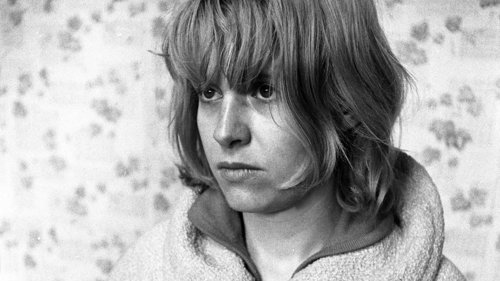
In 1967 Crisis at Christmas is founded by Bill Shearman. The aspiring politician joins forces with a network of homelessness activists in east London, backed by Conservative Shadow Chancellor Iain Macleod MP, ensuring cross-party support. A candle-lit vigil the Sunday before Christmas is attended by 3,000 people in Hyde Park, raising £7,000 for homelessness organisations working in the East End.
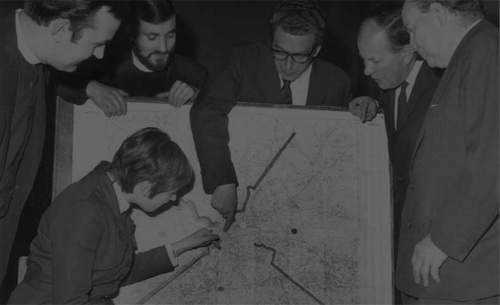
A reverse pilgrimage from Canterbury to London known as the Bishop’s March, led by Bishop Ramsay, helps put Crisis on the map.
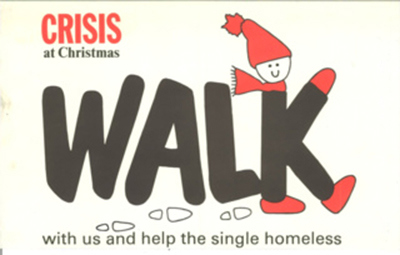
Iain Macleod passes away and Bill Shearman ends his involvement with Crisis at Christmas, yet in 1971, 20 volunteers create the first ‘Open Christmas’ in London, bringing homeless people into a derelict church over the festive period. The first Crisis Carol Service also takes place at Southwark cathedral.
Crisis at Christmas is registered as a charity with trustees including Ronnie Corbett and Baroness Macleod. Open Christmas grows while volunteers lobby Government for greater protection for homeless people, building a movement.
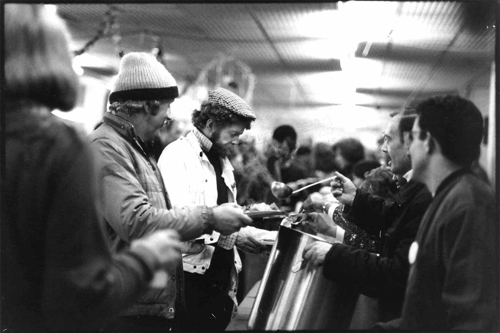
Campaigning leads to the 1977 Housing (Homeless Persons) Act, giving the first legal definition of homelessness. To this day there is no other country in the world where homeless people have a legal entitlement to settled housing enforced by the courts. Crucially though, it denies single homeless people the same protection as families under the law.
Crisis is reaching a turning point. The charity’s Christmas operation has grown to look after more than 400 homeless people each year. Crisis’ first radio appeal raises more than £55,000.
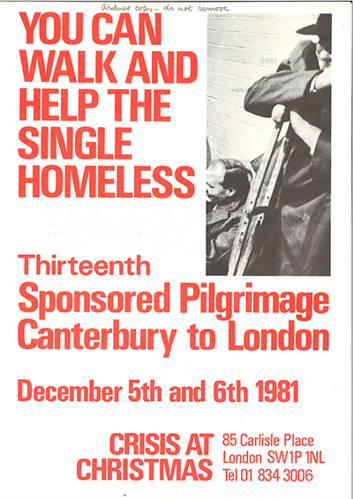
Crisis and Shelter operate first emergency winter shelters outside of Christmas with funding from the Government, and Crisis takes on its first full-time staff.
HRH Princess Alexandra becomes Crisis patron.
Crisis opens an office in Manchester.
Crisis appoints Mark Scothern as its first Chief Executive and under his direction the charity launches its first extensive research programme. This looks into areas such as suicide rates, begging, elderly rough sleeping and the plight of single homeless people.
Crisis becomes the official name of the organisation. While the Christmas appeal continues to grow, a proactive grants programme begins funding a series of year-round schemes such as a clothing run, WinterWatch (a network of night shelters), FareShare (a food redistribution scheme) and SmartMove (an early scheme to help homeless people into private rented homes).
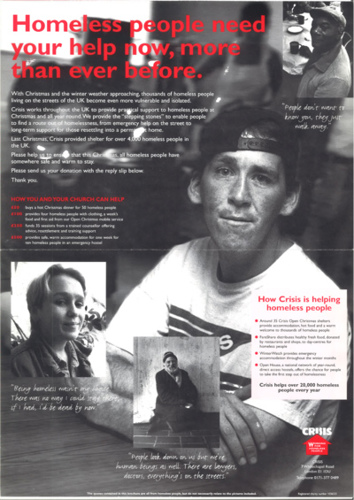
Shaks Ghosh is appointed as Chief Executive. By the end of the nineties, concerted efforts to tackle rough sleeping have changed the profile of homelessness and lead to a focus on the underlying issues preventing people from securing a decent home.
Crisis launches the 'Skylight' model and its first education and training centre opens in London, providing activities and support for homeless people who often can't stay in homeless hostels during the daytime. Arts classes, a Learning Zone and training café fill gaps in education and work experience. The centre is recognised at the 2004 Charity Awards as a true innovator in tackling homelessness.
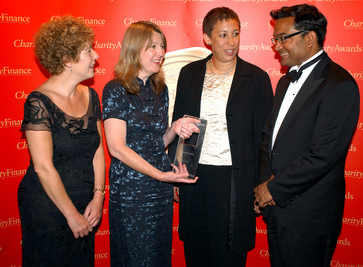
Crisis Open Christmas appears as a short feature in ITV's London Tonight news programme.
Leslie Morphy is appointed Chief Executive.
Second Crisis Skylight centre opens in Newcastle.
Crisis starts developing a presence in Scotland with services starting in Edinburgh. Services also start in Birmingham.
Crisis opens services in Oxford and Merseyside.
Crisis receives a Department for Communities and Local Government grant to fund private rental sector schemes and its work across the UK establishes the organisation as an expert in this area. Since then, schemes supported by Crisis have helped more than 8,000 people find a keep a decent privately rented home.
With rough sleeping once again rising steadily, research and campaigning become increasingly important to the charity’s identity. The annual state-of-the-nation Homelessness Monitor report commences, helping to both deepen and widen understanding of homelessness and its causes in England, Wales, Scotland and Northern Ireland.
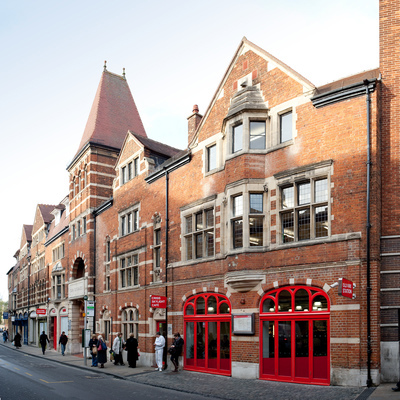
Significant highlights include the Ed Sheeran-backed No Going Home campaign protecting housing benefit for under 35s.
Crisis Skylight services open in Coventry and South Yorkshire.
More than 45,000 people support the No One Turned Away campaign, calling for a change to the longstanding injustice that sees many single homeless people turned away to sleep on the streets when they ask local authorities for help.
Jon Sparkes is appointed Chief Executive
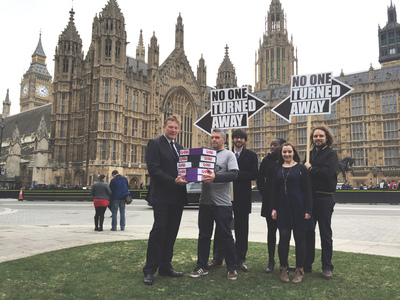
Crisis’ intervention in a landmark Supreme Court case helps improve protection for the most vulnerable people sleeping rough in England. As a result, single homeless people no longer have to prove they are particularly vulnerable compared to other homeless people in order to qualify for support from local councils.
Crisis opens in Wales, helping people experiencing homelessness turn around their lives through education, employment and one to one support with health, wellbeing and housing at Crisis Skylight South Wales.
Conservative MP Bob Blackman's Homelessness Reduction Bill, supported by Crisis' No One Turned Away campaign, becomes law in England.
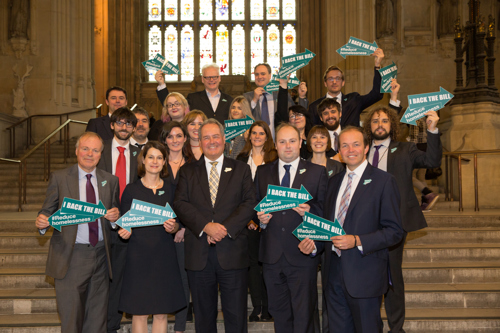
In 2017 Scottish First Minister, Nicola Sturgeon, established the Homelessness and Rough Sleeping Action Group (HARSAG) to identify the actions needed to end homelessness in Scotland. The HARSAG group was chaired by Crisis Chief Executive Jon Sparkes and its work produced recommendations for Scottish Government. In response to these recommendations, Scottish Government adopted a five-year high level action plan to end homelessness, which includes many recommendations from Crisis' plan to end homelessness.
Success: The Scottish Government became the first government in Great Britain to produce a plan to end homelessness in all its forms.
The Scottish Government announced a life-changing alteration to the Unsuitable Accommodation Order in response to our Life in Limbo campaign. Our members with lived experience of homelessness, and supporters who contacted their MSPs and responded to the Scottish Government's consultation on the law change, were instrumental in winning this campaign.
Success: The legislation is to become effective in 2021, meaning no one in Scotland should have to live in unsuitable temporary accommodation, such as B&Bs, for more than seven days.
We worked with the All Party Parliamentary Group on Ending Homelessness on A Safe Home, a campaign calling for the Domestic Abuse Bill to ensure people fleeing domestic abuse in England are able to go to their council and be offered a safe, permanent home.
Success: In May 2020, the UK Government announced that it will amend the Domestic Abuse Bill so that anyone made homeless in England as a result of domestic abuse will have a legal right to housing.
The Domestic Abuse Bill received royal assent in April 2021, and the law change has now come into force.
Find out more about A Safe Home campaign.
Through our Cover the Cost campaign, we'd been calling for the UK Government to invest in housing benefit so that it covers the cost of rents.
Success: In March 2020, the UK Chancellor announced that housing benefit would be uprated to cover at least the cheapest third of rents for 12 months in order to prevent homelessness in light of the coronavirus outbreak.
Changes to the Immigration Rules published in October 2020 made rough sleeping grounds for refusing or cancelling a person's permission to remain in the UK. Over 44,500 people signed our petition and over 75 organisations joined our call to the UK Government to drop these cruel plans to punish people experiencing homelessness.
Success: While we didn't manage to prevent these rules from coming into force, public pressure played an important role in ensuring that the Home Office provided guidance that the policy should only be used in limited circumstances.
In May 2021, Crisis, along with over 65 other organisations, released a joint statement condemning the UK Government's plans.
Since 1824, the Vagrancy Act has made it a crime just to sleep rough or beg in England and Wales. People sleeping rough could face police action and a fine of up to £1,000.
We've campaigned to repeal the Vagrancy since the 1990s, but in 2022, we finally did it!
In February 2022, after thousands of Crisis supporters contacted their MP, emailed Government ministers, and shared the campaign online, MPs voted to make repeal a matter of law. This means that, when the legislation comes into effect, sleeping rough will no longer be a crime in England and Wales.
Find out more about the Scrap the Act campaign and how we're standing against government plans that could criminalise homelessness by the back door.
Matt Downie was appointed the Chief Executive of Crisis.
Exempt accommodation is a form of shared housing for people with support needs.
Some rogue landlords are exploiting the system for profit while leaving people in unsafe, dangerous shared housing with little to no support.
We supported a Bill in Parliament that will bring in new laws to root out rogue landlords and protect people living in exempt accommodation.
After months of pressure from Crisis supporters, the Bill passed in Parliament and received Royal Assent in June 2023 - a huge campaign win!
This will transform the lives of thousands of people facing homelessness in England.
Find out more about our Regulate the Rogues campaign.